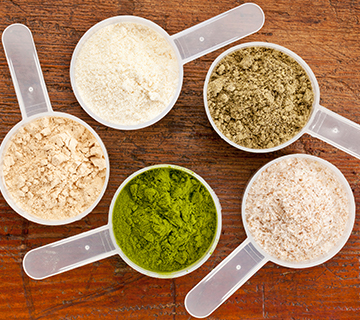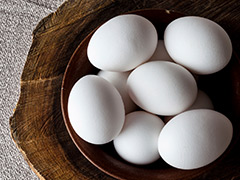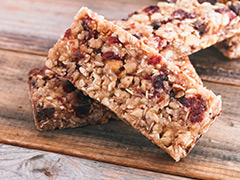Which Protein Powder is Best for You?

Are you looking to add more protein into your diet? Meats and other protein-packed foods can be expensive and time-consuming to prepare. If you’re looking for a quick and easy way to up your intake, then protein powders may be the answer. Protein powders can help increase muscle mass, improve overall body composition and help you meet your protein needs. But not all protein powders are for everyone. We’ll help you decide which type is best for you.
Whey Protein
One of the most widely-used protein powders is whey. Whey digests quickly and contains lots of branched-chain amino acids (BCAAs), which promote muscle growth and recovery. It can also improve body composition by helping replace fat mass with lean mass. Whey is a milk-based protein, so if you’re lactose intolerant, go for an isolate version—the lactose is lost during processing.
Casein Protein
Like whey, casein is also a milk-based protein. However, casein is digested and absorbed slowly. Casein’s advantage over whey comes when fewer calories are consumed because it extends the amount of exposure your muscles have to the amino acids over time. It does this by forming a gel in your stomach, which delays your bloodstream’s absorption of BCAAs. This process also helps reduce the rate of muscle protein breakdown.
Egg Protein
Of all whole foods, eggs have the highest protein digestibility-corrected amino acid score (PDCAAS), which measures a protein’s quality and digestibility. Egg protein provides all nine of the essential amino acids (histidine, isoleucine, leucine, lysine, methionine, phenylalanine, threonine, tryptophan, and valine) that your body can't make itself. Egg protein also comes in a close second to whey as the highest source of leucine, the BCAA that plays the largest role in muscle health. This makes egg protein powder a great alternative to milk-based powders.
Pea Protein
Vegetarians, vegans and people with dairy or egg allergies may be interested in pea protein. It’s made from yellow split-peas, which contain eight of the nine essential amino acids. It’s also rich in BCAAs and absorbs faster than casein. So, as it turns out, pea protein powder is actually a very suitable contender against animal-based protein powders when it comes to muscle growth.
Mixed Plant Proteins
Some protein powders contain two or more plant-based proteins blended together. Typical ingredients include brown rice, pea, hemp, alfalfa, chia seeds, flax seeds, artichoke and quinoa. When blended together, certain mixtures provide the body with all nine of the essential amino acids. Though high fiber content can cause these proteins to be absorbed slower, enzymes are often added to the powders to speed things up. When these are added, mixed plant protein powders produce similar results as other protein powders.


